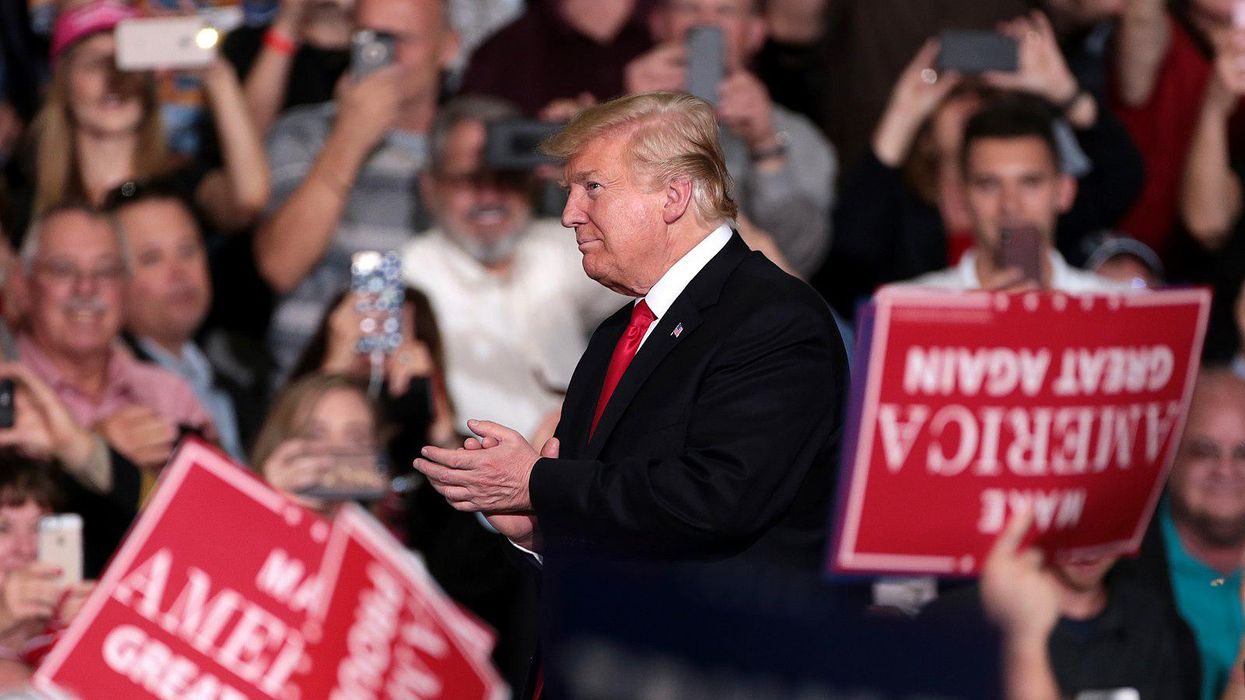Joe Biden had more votes than Donald Trump during every day of voting in the 2020 presidential election in Maricopa County, Arizona, according to a new report by a team of experienced election auditors who have used public records to show why the Arizona state Senate's "audit" of the election is a "hoax."
"Joe Biden was never behind Donald Trump during the entire election period in Maricopa County," said the August 3 report, "Lessons from Maricopa County: Slow Facts versus Fast Lies in the Battle Against Disinformation," demonstrating this finding with charts and tables based on public election records releasedon November 20.
Moreover, of the "74,822 disaffected Republican supportive voters"—Arizonans who voted for most of the Republicans on the ballots but not for Trump in Maricopa County (greater Phoenix) and Pima County (greater Tucson)—"[t]he most highly disaffected of those, 48,577 (65%) voted for Biden; the remaining 26,245 (35%) voted for candidates who could not win, e.g., the Libertarian candidate (19,873), or by over-voting [voting for more than one presidential candidate] (2,009), or voting for no one (4,363)," the report said.
"To put the 48,577 disaffected Republican voters who voted for Biden in perspective, they represent 4.6 times the statewide margin of Trump's 10,457 vote loss to Biden," it said.
The August 3 report by Benny White, a longtime Arizona Republican Party election observer, Larry Moore, retired CEO of Clear Ballot, a federally certified election auditing and technology firm, and Tim Halvorsen, Clear Ballot's retired chief technology officer, is the trio's most recent research that draws on public records to refute and debunk the "large-scale disinformation campaign" that Trump won in Arizona, one of the 2020 election's closest swing states.
"With over 35 years of combined election experience, we know that there are publicly available tools and data that can debunk election disinformation," the authors said. "If legislators, litigators, and judges were aware of this data, they could be more effective in stopping additional 'forensic audits.' Armed with hard data, the media could shift the narrative away from anecdotal 'evidence' and 'concerns' to facts."
The significance of the report is not limited to Arizona. Its approach could serve as a blueprint to counter the "bad faith" audits underway or eyed by pro-Trump factions in other states, by using public records to prove which party's voters turned out and how they voted. Its evidence-based analysis has not widely been used across the country as Trump has continued to deny that he lost, and as a new pro-Trump industry has emerged that is dedicated to casting doubts on election results by attacking little-known election administration details.
The report also offers a road map to specifically assess and debunk the Arizona state Senate's "audit" led by pro-Trump contractors by showing how they failed to accurately account for the number of ballots cast last fall, and the votes on those ballots.
More Evidence Republicans Rejected Trump
But what's most newsworthy are new details about the Arizona Republicans who rejected Trump by tens of thousands and in many cases voted for Biden. The report comes as a pro-Trump Arizona state senator has used a little-known law to launch a state attorney general investigation into Maricopa County's refusal to turn over more confidential election records. That pressure tactic likely will perpetuate more disinformation about the election's outcome among Trump supporters.
"There have been many discussions about mail ballots and the effect those ballots may have had on the results," the experienced auditors' report said, referring to the way most Arizonans voted last fall. "The Cast Vote Record [or spreadsheet of every vote on every ballot], 'Voted' file [listing voters who cast ballots], and voter histories from the voter registration files provide an enormous amount of information to help the public understand what happened during the election."
Those three public records revealed that nearly 75,000 Arizonans in Maricopa and Pima Counties voted for most Republicans on the ballots but not for Trump, and revealed where those disaffected Republican voters were located—the voter turnout patterns for Republican-leaning voters rejecting Trump.
Arizona, like many Western states, has a decades-long history of using mailed-out ballots and also offers in-person voting at vote centers before Election Day. Many Republicans did not heed Trump's call to vote only in person on Election Day, November 3—which became part of his claim that only in-person Election Day votes should count, as he assumed that the earlier votes or votes by mailed-out ballot were mostly cast by Democrats. Public records reveal that more Republicans than Democratsvoted early or voted by mailed-out ballot in greater Phoenix.
"Republican voters retained their mail ballots until the last minute and then returned about 20,000 more ballots than the Democrats," the report said. "There were also more Republicans, about 36,000 more, who went to the polling places on Election Day. Those ballots cast by Republican voters helped reduce the lead Joe Biden had over Donald Trump in the mail and early voting before Election Day but there were not enough of them to win."
The report's analysis goes deeper, by finding "the level of disaffection [among voters who voted for a majority of Republicans on the ballots but not for Trump] reached 3 percent to five percent of the total ballots cast in a large number of precincts [with more registered Republicans than Democrats]." The report also pinpointed the small suburban cities where Republicans rejected Trump. It included a map showing that Phoenix's northeastern and southeastern suburbs—surrounding Paradise Valley, Chandler and Gilbert—widely rejected Trump.
These details go beyond most criticisms of the Senate's audit by citing factual voter turnout patterns to document Trump's loss. The report has other sections that are intended to hold the Senate's partisan contractors to account, and explains why the contractors' analysis is almost certainly flawed or even fabricated.
Before explaining the contractors' missteps, the outside auditors noted in their report that Arizona state Senate President Karen Fann, who repeatedly has said that the inquiry is intended to boost voters' public confidence in Arizona elections, had sent emails privately "touting" her post-election phone call with Trump. That was one indication, among many, that the so-called audit was a partisan ruse.
"When we found out that… [Cyber Ninjas, the lead contractor,] were withholding counts and other information from Ken Bennett, the Senate liaison to the Cyber Ninjas, we decided to challenge the credibility and accuracy of the hand-count," the outside auditors wrote, explaining their motives, prior challenges to Fann's team, and an analysis that details how to judge Cyber Ninjas' work.
"We issued our first challenge on June 7, 2021. We urged Senator Fann to increase her 'audit' transparency by randomly comparing their ballot and vote counts with the Cast Vote Record," the report said. "We intended to increase transparency by publicly confirming the accuracy of their count and, in their confirmation, set them on a path to confirm or dispute the official results credibly. More importantly, we wanted to signal to Senator Fann and the Ninjas that we could hold them accountable."
How To Audit Cyber Ninjas
The outside auditors said in their report that it was Cyber Ninjas' process that now must be audited.
"In short, without an audit, it would be nearly impossible to refute another round of disinformation," they wrote. "Without a comparison to the official results, the Ninjas could say anything. Senator Fann has already said that… [Cyber Ninjas' hand] count [of presidential votes] did not match the official [presidential vote] count. Without verifiable details, statements like hers spawn more disinformation."
The report noted that Cyber Ninjas have covered up their lack of election auditing experience by trying to shift the focus to Maricopa County, where Fann, who hired Cyber Ninjas, has blamed the Maricopa County Elections Department, saying that the county was "uncooperative," "ballots were missing," "files were deleted," "there was no way to be sure which ballots should be counted," "critical pieces of equipment were not delivered (e.g., routers)," and "equipment could not be accessed due to passwords not being provided."
"Many of these allegations have been proven false," the report noted. "Without an independent count—ballots, and votes—to compare… [Cyber Ninjas'] count against, there would be no way to audit the Ninjas' much-criticized recount. Without numerous points of comparison, quickly analyzing and resolving discrepancies would not be possible."
"The threat of more disinformation is real," the authors said.
It cited a July 15 legislative briefing where two of the Arizona Senate's top contractors had questions about tens of thousands of ballots—ballots that they could not explain, but which the outside auditors accounted for in their report. Trump recited the contractors' claims, made without offering any proof, in statements after the briefing and during a Phoenix speech on July 24.
In contrast to those propaganda-filled narratives, the report noted that Fann has said that Cyber Ninjas' hand count totals did not match the election's official results. Her admission came a day after the report's authors challenged the Senate's contractors to compare their count of the number of ballots in 1,634 storage boxes with the totals that the report's authors gleaned from public records. (In July, Fann initiated a second recount of the number of paper ballots from Maricopa County, which sources working inside the Arizona Senate's audit have told Voting Booth was an effort to understand the extent of the hand count's errors.) To date, Fann has not released the results of the hand count of presidential votes nor its follow-up count of the number of paper ballots; each of which should total 2,089,563 ballots.
The outside auditors noted that Cyber Ninjas did not count votes in the same increments as Maricopa County did, which the contractors should have done if they wanted an apples-to-apples comparison against the official vote count. That more authoritative process would have been based on tracking the results by ballot-counting groups (from early voting sites and county facilities processing mailed-out ballots) and from Election Day precincts. But Cyber Ninjas did not do that.
"The Ninjas' count of ballots and votes is inaccurate primarily because of the inherent inaccuracy of their methodology," the report said. "In our experience, without well-developed ballot control procedures, it is difficult to maintain a ballot count. Without an accurate ballot count, accuracy in the vote count is impossible." In other words, there are layers involved in an accurate audit that first relate to ensuring the inventory of ballots to be recounted is correct (as some ballots are duplicated, for various reasons, or are test decks), and then counting the actual votes in question on a well-controlled inventory of ballots.
The report also provides election data and analyses from public records that are intended to hold Cyber Ninjas to account—so the contractors might finally admit that Maricopa County's official 2020 election results were accurate, and that the contractors' so-called "forensic audit"—a technical term hijacked by Trump partisans—was flawed.
In short, the report's authors have used a mix of public records that affirm there were 2,089,563 ballots cast in Maricopa County's presidential election, and they account for all the votes cast (or not cast) for president on those ballots. They have repeatedly shared that information with the press and Fann, and challenged the Senate's contractors to prove them wrong. The contractors have so far not publicly replied, but the outside auditors have kept up the pressure, including trying to pre-empt what they believe would be disinformation by Fann's team.
"The information we have provided will enable an audit with 1,634 ballot points of comparison—one for each [storage] box. There are 8,170 vote points of comparison—[votes for] five candidates multiplied by 1,634 boxes (the Ninjas were counting five candidates—three in the race for President and two for U.S. Senator)," the report said. "It would be intentional disinformation if the Senate published a report that showed five numbers—the grand totals for the three candidates in the Presidential contest and two for the candidates in the U.S. Senate contest."
In other words, the report's authors are saying that the Senate's contractors cannot simply issue purported vote totals in each race and claim that they have conducted a credible audit whose results are accurate.
Whether or not the Cyber Ninjas will publish their analysis is an open question. In a July 15 legislative briefing, Arizona Senate Judiciary Committee Chairman Warren Petersen suggested that the Senate's contractors may not be able to conclude their inquiry if Maricopa County refuses to share all of its records, including data used by law enforcement. Days later, the Senate then issued new subpoenas to the county, including seeking confidential law enforcement data.
The report's authors flagged the possibility that the Senate may seek to cover up the lapses of their contractors by manufacturing disinformation about the latest subpoenas.
"Imagine how dangerous it would be if, after their six-month-long process, their [the Senate's] report said, 'We have found thousands of extra ballots that call into question the integrity of Maricopa County election administration. Since the County did not provide us with everything we asked for and refused to answer our questions, we ask that this matter be referred to the Arizona Attorney General,'" the report said, noting that scenario was "realistic."
On August 2, a day before the outside auditors' report was issued, Arizona Sen. Sonny Borrelli, a Republican repeatedly praised by Trump at his July 24 rally in Phoenix, "invoked a law to prompt an attorney general investigation into the Maricopa County Board of Supervisors, one day after the board rebuffed a subpoena related to the ongoing audit of the November 2020 election," the Arizona Republic reported.
"Without a detailed, independent audit, the Senate's review—we fear—will remain the nation's blueprint for election disinformation," outside auditors and co-authors of the report White and Moore wrote in an August 3 commentary published in the Arizona Republic. "Senator Fann, show the public your data."
This article was produced by Voting Booth, a project of the Independent Media Institute.












